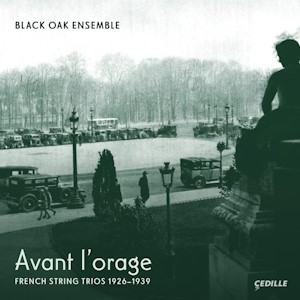
Avant l’orage
French String Trios 1926-1939
Henri Tomasi (1901–1971)
Trio à cordes en forme de divertissement (1938)*
Jean Cras (1879–1932)
Trio (1926)
Émile Goué (1904–1946)
Trio (1939)
Jean Françaix (1912–1997)
Trio (1933)
Robert Casadesus (1899–1972)
Trio à cordes (1938)*
Gustave Samazeuilh (1877–1967)
Suite (1937)*
Gabriel Pierné (1863–1937)
Trois pièces en trio (1937)
Black Oak Ensemble
rec. 2021/22, Chicago
* First recordings
Cedille CDR90000212 [2 CDs: 127]
This is another foray of mine into other combinations for three players beyond my favourite grouping of piano, violin and cello. It follows on from a fairly successful exploration of the clarinet trio (review). The absence of the different timbre of the piano does make for a quite different soundworld, but the programming did interest me. I knew enough of six of the composers, Samazeuilh being the exception, to feel confident that the music would not be beyond my preferred boundaries. The works cover music from early in a career (Françaix) to very late (Pierné).
As it turned out, it was the new (to me) composer, Gustave Samazeuilh, whose work was a standout. His six-movement Suite harks back to earlier times, with movements based on old dances, though the music itself is more of the late nineteenth century. When I read that his teachers were Chausson, Dukas and d’Indy, I understood why I liked this work. Sadly, not much of his music has been recorded, and what there is, is dominated by solo piano.
Less surprising was the quality of the work by Jean Cras, whose music has always impressed me. At almost twenty-five minutes, his Trio is the most substantial on the album, and for me, every single minute is enjoyable. Each of the four movements has a different feel, with the third – Animé – being a particular delight. It is so disappointing that the very enterprising French label Timpani, which did so much to promote Cras’ music is no more, though some of their releases are still available to purchase as downloads through Presto Classical.
Jean Françaix’s trio, written at age twenty-one, is typical of the composer: full of humour and vitality, with a light touch, but not insubstantial. Another highlight, without doubt.
I had encountered the music of Émile Goué before in a disc of chamber works (review), where I used the descriptors “troubled”, “agitated” and “angst-ridden”, as well as “somewhat dissonant” so I was expecting to encounter a similar style in his String Trio. However, while there were some less than consonant passages, the general atmosphere was more upbeat, indeed somewhat folk-inflected. It certainly is another of the definite successes.
Tomasi’s Trio took some time to grow on me. It is less melodic than I’d expected, concentrating more on hectic rhythms for three of its four movements, and it becomes a little tiring in places. However, I would expect it to be quite thrilling seen in concert.
I found it hard to warm to Pierné’s Trois pieces, which surprised me based on previous encounters with his music. The first movement features themes based on the names of the dedicatees, the brothers Pasquier who premiered it after Pierné’s death. I found it too lengthy at over nine minutes, and the slow second movement did not improve matters. The rhythms of the playful finale were enjoyable, but not enough to rescue the work in my eyes.
Robert Casadesus is better known as a concert pianist, but wrote a very considerable amount of music, some of which I’d heard before. I found this Trio hard going: cold, unemotional and lacking much melodic or indeed rhythmic appeal.
I had not heard any of these works before, not surprising since only the Françaix has received more than two other recordings. I compared the Black Oak Ensemble’s performance of the Françaix to that by the Lendvai trio on Stone Records, which had been well received on this site (review), and found the new recording to have more character. Black Oak’s tempos are also more swift. On this somewhat limited basis, I would suggest that these are very fine performances of mostly very fine music. At no time did I find string timbre, especially of the violin, to be a problem – for me, that is as good a commendation as you can get. The recording is good, and the booklet notes very informative.
If you look at the date of our first review of this release, you will suspect I have been sitting on my review for a year, but that isn’t the case: this was in a recent list, and it seems to be Cedille’s practice to send out releases of the past year, presumably to refresh interest by new reviews. That being the case, I am pleased that I was caught in their net. I may not have loved everything I heard, but I did enjoy the journey of discovery.
David Barker
Previous review: Stephen Greenbank (August 2022)
Help us financially by purchasing from




















